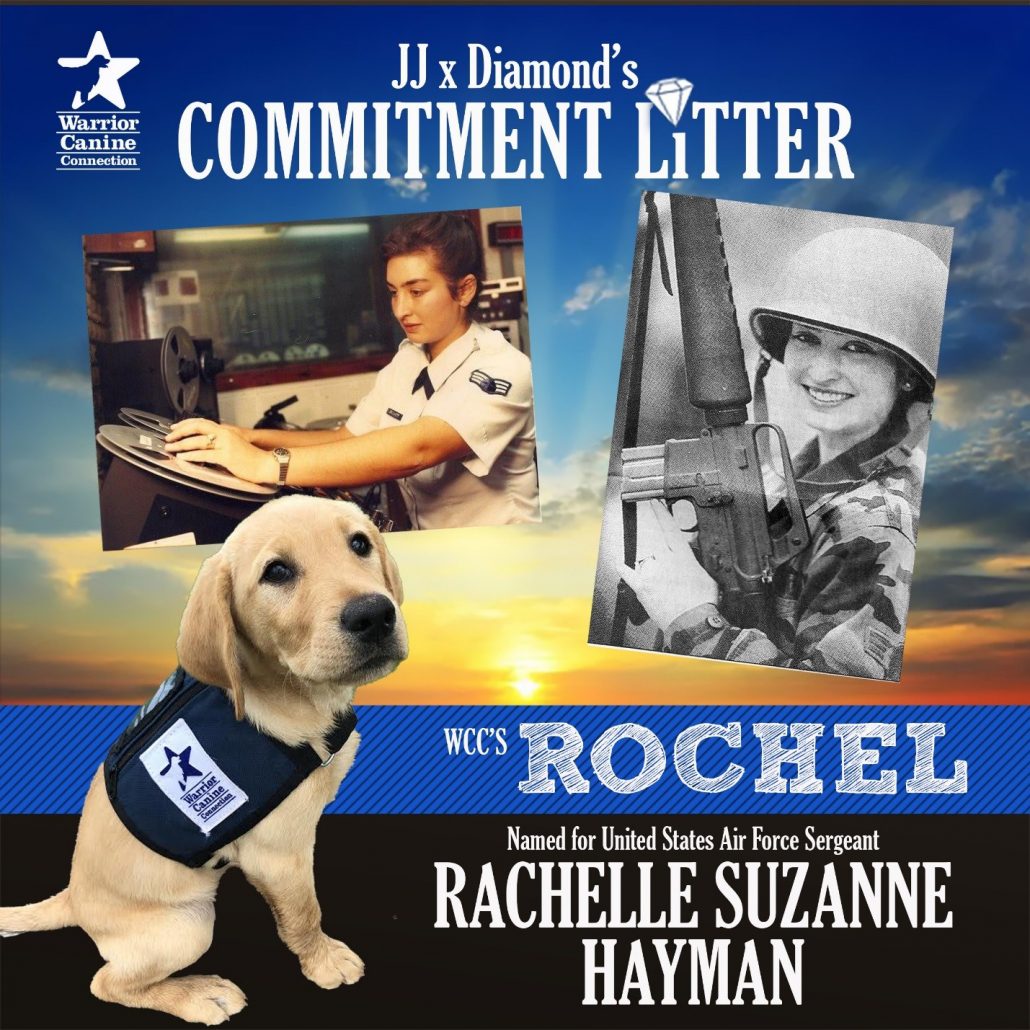FOR IMMEDIATE RELEASE
July 10, 2020
Washington, D.C. – Warrior Canine Connection (WCC), a nonprofit that breeds, trains and places service dogs with Service Members and Veterans with visible and invisible wounds, has named one of its future services dogs from its Commitment Litter “Rochel” after Air Force Sergeant Rachelle ‘Rochel’ Suzanne Hayman.
“WCC names all its puppies after Service Members and Veterans who have made significant contributions to our nation,” Alyssa Malaspina, who coordinates WCC’s Namesake Program. “We take special care to honor heroes such as Rochel Hayman, to those who’ve served as far back as World War II to the present day. Learning from our living namesakes, their families, widows, moms, dads, siblings and friends is a rich tradition that honors their military service and helps to keep their legacies alive.”
“I know Warrior Canine Connection, and I know the critical impact they have with what they do. When I heard they wanted to name one of their dogs after me, I was speechless and overwhelmed. It’s such a tremendous merit I don’t feel deserving of, but my children are so excited and proud, so I accepted. I trust WCC Rochel will serve with love and kindness and to the best of her capabilities,” Hayman said.
Air Force Sergeant Hayman grew up in Farmington Hills, Michigan. Sgt. Hayman planned to study broadcasting in college, but her path took a turn upon meeting an Air Force recruiter who told her that she could pursue her interests in radio and television while serving in the military. Sgt. Hayman was stationed at Yokota Air Base, Japan for two years. While she predominately worked in radio, Sgt. Hayman had many opportunities to enhance her live shows with interviews of touring pop music artists. After being stationed in Japan, Sgt. Hayman served for two and a half years on the island of Crete, Greece at the now closed Iraklion Air Station in both radio and television.
Later, when Radio and Television Broadcasting Specialists were sought to volunteer for duty in Saudi Arabia during Operation Desert Shield, Sgt. Hayman saw an opportunity to continue her service and was subsequently assigned to a radio pod in Dhahran at the beginning of the Gulf War. Sgt. Hayman continues to be grateful for her opportunities to use her skills and gifts in a positive way and in service to our nation. She is an active member in the Jewish War Veterans of the USA and Chairwoman of the JWV Gulf War Committee.
For more information, please contact Programs and Public Relations Coordinator Cara Rinkoff at (202) 265-6280 ext. 413 or crinkoff@jwv.org.
About Warrior Canine Connection
Warrior Canine Connection is a pioneering organization that utilizes a Mission Based Trauma Recovery model to empower returning combat Veterans who have sustained physical and psychological wounds while in service to our country. Based on the concept of Warriors helping Warriors, WCC’s therapeutic service dog training program is designed to mitigate symptoms of post-traumatic stress disorder, traumatic brain injury, and other challenges, while giving injured combat Veterans a sense of purpose, and help in reintegrating back into their families and communities. For more information, visit www.warriorcanineconnection.org.
About Jewish War Veterans of the United States of America
Founded in 1896, the Jewish War Veterans of the United States of America is the oldest active veterans’ organization in America. JWV is dedicated to upholding America’s democratic traditions and fighting bigotry, prejudice, injustice, and discrimination of all kinds. As a national organization, JWV represents the voice of America’s Jewish veterans on issues related to veterans’ benefits, foreign policy, and national security. JWV also commits itself to the assistance of oppressed Jews worldwide.


